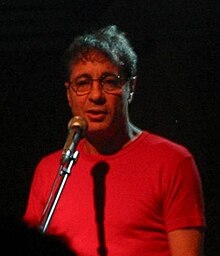| Revision as of 07:30, 4 October 2011 editKoavf (talk | contribs)Extended confirmed users2,174,994 edits Removing link(s) to "200 Greatest Israelis": redlink. (TW)← Previous edit | Revision as of 07:35, 15 December 2011 edit undoRjwilmsiBot (talk | contribs)Bots, Pending changes reviewers1,602,950 editsm →External links: Adding Persondata using AWB (7876)Next edit → | ||
| Line 106: | Line 106: | ||
| {{Persondata <!-- Metadata: see ]. --> | {{Persondata <!-- Metadata: see ]. --> | ||
| | |
|NAME= Geffen, Yehonatan | ||
| |ALTERNATIVE NAMES= | |||
| |alternative names= | |||
| |SHORT DESCRIPTION= | |||
| |short description= | |||
| |DATE OF BIRTH= February 22, 1947 | |||
| |date of birth= | |||
| | |
|PLACE OF BIRTH= | ||
| | |
|DATE OF DEATH= | ||
| | |
|PLACE OF DEATH= | ||
| }} | }} | ||
| {{DEFAULTSORT:Geffen, Yehonatan}} | {{DEFAULTSORT:Geffen, Yehonatan}} | ||
Revision as of 07:35, 15 December 2011
| Yehonatan Geffen | |
|---|---|
 | |
| Born | (1947-02-22) February 22, 1947 (age 77) |
| Nationality | Israeli |
| Occupation(s) | Author, poet, songwriter, journalist, and playwright |
| Spouse | Nurit |
| Children | Aviv Geffen, Shira Geffen, and Natasha Geffen |
| Relatives | nephew of Moshe Dayan |
Yehonatan Geffen (Heb: יהונתן גפן; born on February 22, 1947) also known as Yonatan Gefen, is an Israeli author, poet, songwriter, journalist, and playwright.
Biography
Geffen was born in moshav Nahalal. He is the father of Aviv Geffen, Shira Geffen and Natasha Geffen, as well as being Moshe Dayan's nephew. He has two grandsons.
In 1965, he served as a paratrooper under Matan Vilnai, and became an officer.
In 1967, his mother overdosed on her medication and died. Geffen considers it to have been suicide.
After leaving the army in 1969 and moving to Tel Aviv, he took up poetry.
In 1972, while Geffen was studying in London, his sister Nurit committed suicide, causing him to return to Tel Aviv.
During this period he began writing a column for the weekend supplement of the Ma'ariv newspaper, and he joined the entertainment troupe "Lul" with Uri Zohar, Arik Einstein, and Shalom Hanoch. The latter introduced Geffen to his future wife, Nurit Makober.
He was often criticized for his strong left-wing leanings, which bordered on provocation, and was even sent some death threats. Gefen was one of a group of journalists (including Uri Dan, Yeshayahu Ben Porat, Eitan Haber, Hezi Carmel, Eli Landau and Eli Tavor) who in 1973 published the book The Failure. This was the first book to be document the Yom Kippur War. It criticized the performance of the government and military and also contained first hand descriptions of battles, casualties, injuries and the losses and failures of military hardware. The book aroused considerable public interest.
Much of Gefen's success came from his works for children, like the song "HaYalda Hachi Yafa BaGan" ("The Prettiest Girl in Kindergarten") and the book "HaKeves HaShisha Asar" (the 16th sheep), but he has also written many popular songs, poems, plays and stories for adults. He frequently collaborated with David Broza, rendering Spanish songs into Hebrew.
In 2005, he was voted the 72nd-greatest Israeli of all time, in a poll by the Israeli news website Ynet to determine whom the general public considered the 200 Greatest Israelis.
References
- גיא בניוביץ' (June 20, 1995). "הישראלי מספר 1: יצחק רבין – תרבות ובידור". Ynet. Retrieved July 10, 2011.